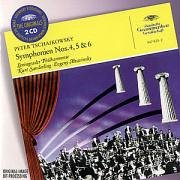Mravinksy's First Edition of Tchaikovsky's Symphonies 5&6
Ralph J. Steinberg | New York, NY United States | 06/19/2000
(3 out of 5 stars)
"I think most readers will be interested to know how this DG Originals set from 1956 compares with Mravinsky's stereo remake from 1960; accordingly, I will limit this review to the Fifth and "Pathetique" Symphonies.I first read about these performances in 1961, when they were still available on American Decca. Ironically, they were mentioned in rather unfavorable reviews of the stereo versions which had been just released. Most reviewers found the earlier mono versions more committed and passionate in interpretation and did not find the sonics of the latter versions a significant improvement over the earlier ones. Comparing the timings of the two editions, the earlier ones are marginally slower, the exception being the March-Scherzo of the Pathetique, which is much slower in the earlier recording. Upon listening, I found the earlier recordings to be indeed more relaxed, lusher, and more smoothly (or perhaps blandly) phrased than the latter edition. In part, this may be due to the more distant and euphonous sound of the mono recordings. Coming then to the latter versions was a shock; here was strong, pointed phrasing, sheer elemental force (NOT mere briskness) that made the 5th sound like a truly heroic and noble work, and the "Pathetique" as a terrifyingly realistic portrayal of a Manic-Depressive Episode. I'm afraid this Beethovenish strength is lacking in the earlier version, in which Tchaikovsky sounds merely like a spinner of pretty, sweet tunes; in the latter version, he sounds like a master builder and dramatist."
Better Than I Remember
Howard G Brown | Port St. Lucie, FL USA | 12/31/2000
(5 out of 5 stars)
"My introduction to Mravinsky and the Leningrad Philharmonic was a Vanguard 2-lp set of the Shostakovich 7th Symphony. I was in high school then, around 1961. I also read a review of the Mravinsky/Tschaikovsky 5th that favored the earlier U.S. Decca version. Since I already had a stereo 5th (von Matacic/Czech Philharmonic on the budget Parliament label)I grabbed the Decca when it showed up at a reduced price in a store's cut-out bin.I really loved that recording -- especially for the pace and force of the 4th movement. Some years later I bought the DG stereo remake, which struck me as a more polished recording overall, but less exciting. For example, I missed the running counterpoint beneath the 4th movts. 2nd subject: it begins in the winds, then the subject is repeated -- enlarged -- by the violins, with horns and basses running beneath. The physical sense of foreward motion is remarkably intense.Now all this and more is again available in even better, cleaner sound than was offered on the old Deccas.Originally, the Fifth was also available in a Decca boxed set that included the Fourth and Sixth Symphonies and the Rachmaninoff Second Symphony, which, like the Tschaikovsky Fourth, was conducted by Kurt Sanderling. The Rachmaninoff was the only uncut version available at that time; it has been released on CD as DG 289449 767-2. Sanderling has recorded some fine Sibelius and Shostakovich recently. In the late 1930s he chose to flee the Nazis by going east and found a haven in Soviet Russia. After the war he continued to pursue his career in eastern Europe. Clearly, this set is not for everyone -- is there ANY recording for everyone? I have yet to find a stereo Pathetique to match either Mravinsky in this set or the 1938 Furtwaengler/Berlin Philharmonic recording -- the only recordings I own, aside from a number of tapes made from radio and television broadcasts."
A nice supplement for Mravinsky lovers
Santa Fe Listener | Santa Fe, NM USA | 11/13/2006
(4 out of 5 stars)
"Until the Eighties, when major reissues began to come out of Evgeny Mravinsky's recorded output, which was sizable, only a few recordings had drifted West, among them a legendary set of the last three Tchaikovsky symphonies from 1960. As everyone else has pointed out, these are earlier versions in mono from 1956 of the Fifth and sixth, coupled with Sanderling's rather ordinary, Teutonic Fourth. DG's reissue certainly makes the mono sonics sound balanced and full, considerably easier on the ears, in fact, than the shrill stereo of the later readings.
However, Mravinsky seems a bit ordinary throughout. One misses the falvanic excitment and nervous tension that marked the stereo recordings. It's true that the finale of the Fifth, after a mild start, suddenly leaps and ahead with more vibrancy. but Mravinsky made a specialty of this work, and his several other recordings strike me as more successful. As for the Pathetique, he has several of those, too. This version lacks inner tension in the opening movement. You feel the conductor's concentration in the Scherzo, however, even if it lacks a degree of frenzy to tighten one's nerves. The finale moves along a course that's more melancholy than tragic, but that may be closer to the composer's intentions for all we know. In any event, this is a nice supplement to Mravinsky's stereo set, and far from negligible, but I'd only buy it at a bargain price given Sanderling's colorless contribution."


 Track Listings (6) - Disc #1
Track Listings (6) - Disc #1